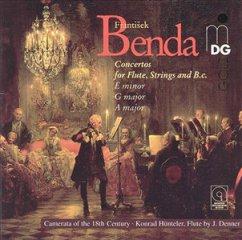Franz Benda - Concertos for Flute, Strings and Basso Continuo (1996)
Franz Benda - Concertos for Flute, Strings and Basso Continuo (1996)

01. Concerto in E minor - Allegro con brio 02. Concerto in E minor - Adagion, un poco Andante 03. Concerto in E minor – Presto 04. Concerto in G major - Allegro 05. Concerto in G major - Largo 06. Concerto in G major - Presto 07. Concerto in A major - Allegretto 08. Concerto in A major - Adagio 09. Concerto in A major - Vivace ma non troppo Konrad Hünteler - flute Presto Camerata of the 18th Century
Franz Benda was one of the leaders in a generation of Bohemian musicians who entered Austrian and German musical life, filling important roles in the development of late Baroque and early Classical music.
Frantisek Benda (later Germanized to Franz) was the oldest of five musical children of a linen weaver and village musician who had married Dorota Brixi, an offspring of another major Bohemian music family. This was the foundation of a dynasty of musicians that continues to this day, when one can readily obtain compact discs performed by a family group called the Benda Musicians.
Frantisek, the eldest, became a choirboy at St. Nicholas church in Prague when he was nine, giving him the opportunity for musical studies. However, he ran away from its discipline at 11 to Dresden, Germany, where he got a similar position and learned violin. He returned to Prague in 1723, becoming alto soloist in a Jesuit seminary, where he received a good general and musical education, remaining there until his voice changed and he then returned home and resumed violin studies.
When he got a little older, he fell in love with a baker's daughter and petitioned the local count for permission to learn the secrets of Bohemian gingerbread. The count offered as an alternative to pay Benda's way to Prague for more violin studies. After ten weeks, his teacher there, Konicek, pronounced him a fully trained professional. Benda later said he learned more by following around a Jewish street musician named Lebel.
The 16-year-old Benda escaped Bohemia without permission and got work in Poland. Benda formed a house orchestra for Governor Suchaczewski that was so good he was hired away by the King of Poland, Augustus II the Strong, in 1732. The king died a year later, leaving Benda unemployed. He went to Dresden, got a job, and came to the attention of King Frederick the Great of Prussia, who hired him in 1740 to a job Benda kept for life. He even accompanied Frederick (who was a flute player) on his military campaigns. He had six children, among whom four (two boys and two girls) became professional musicians. His main compositional legacy is an assortment of violin sonatas written at the Prussian court, in which he influenced the future development of violin playing. These manuscripts also contain many observations about style and ornamentation of the period, valuable to research in the "authentic" performance movement. --- Joseph Stevenson, Rovi
download (mp3 @320 kbs):
yandex 4shared mega mediafire zalivalka cloudmailru uplea








